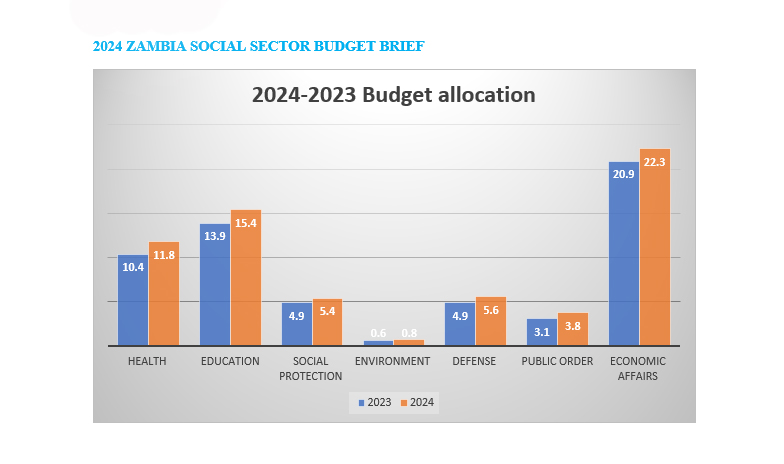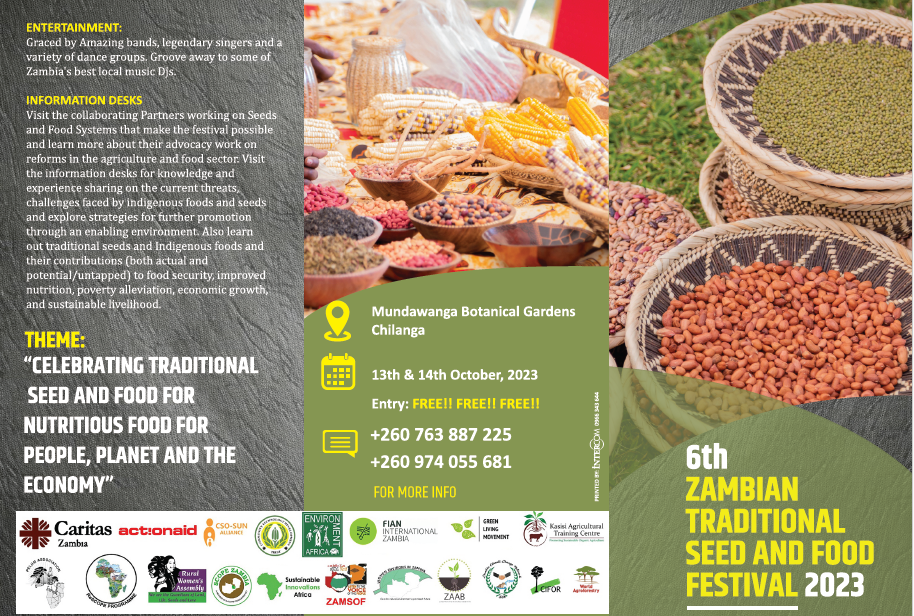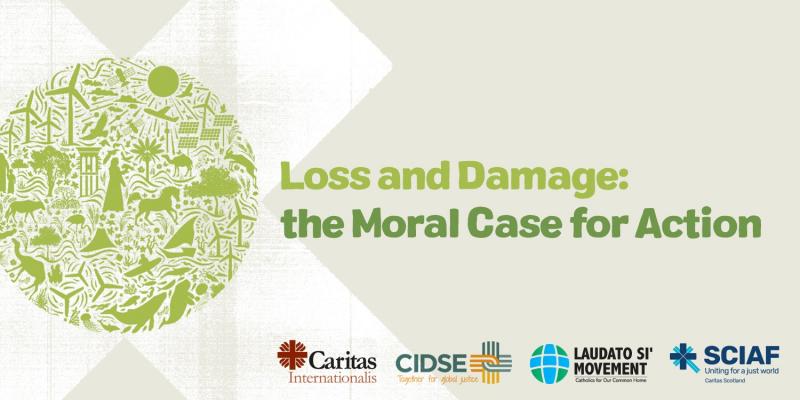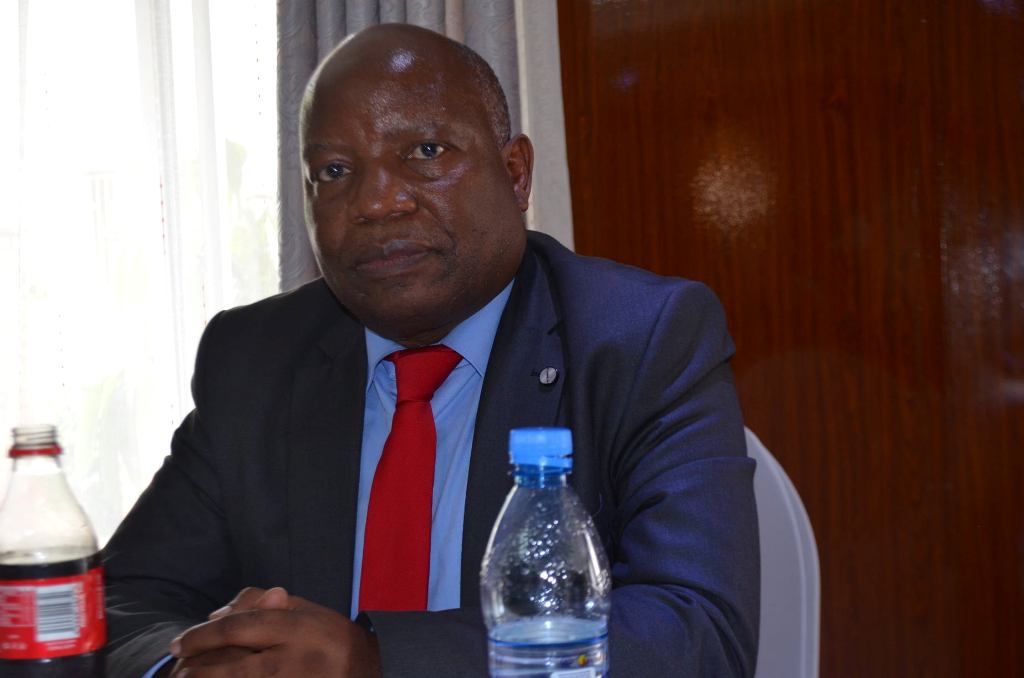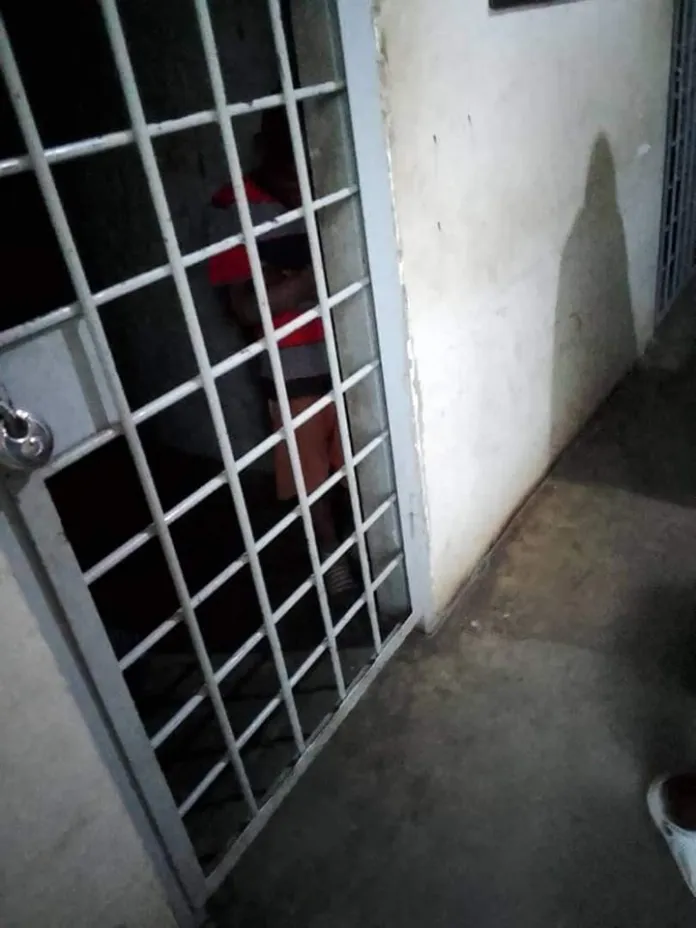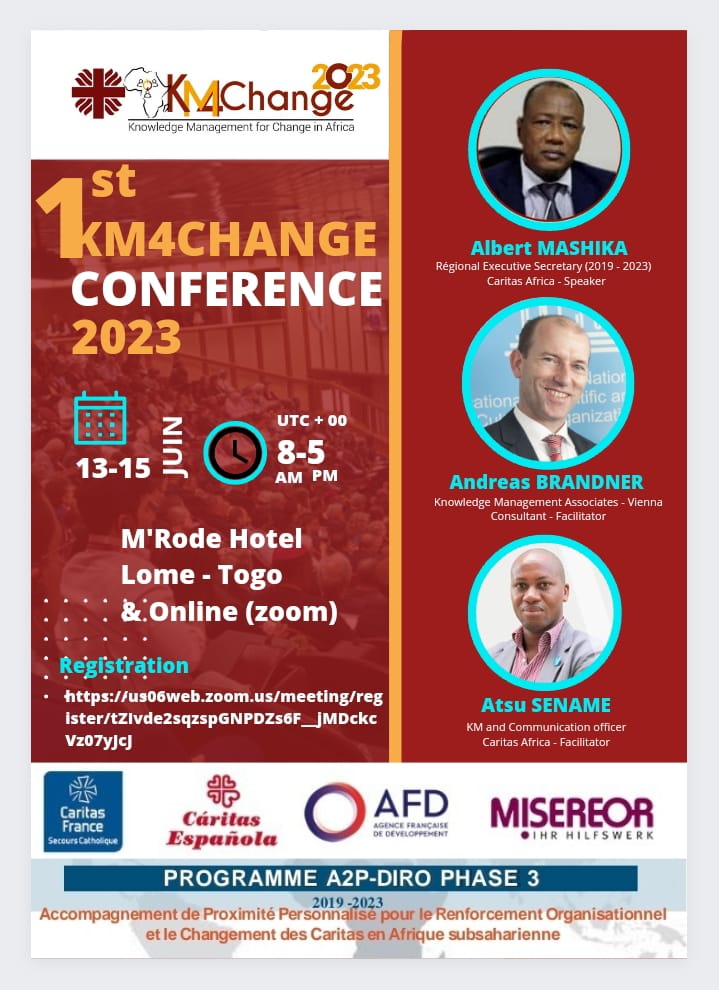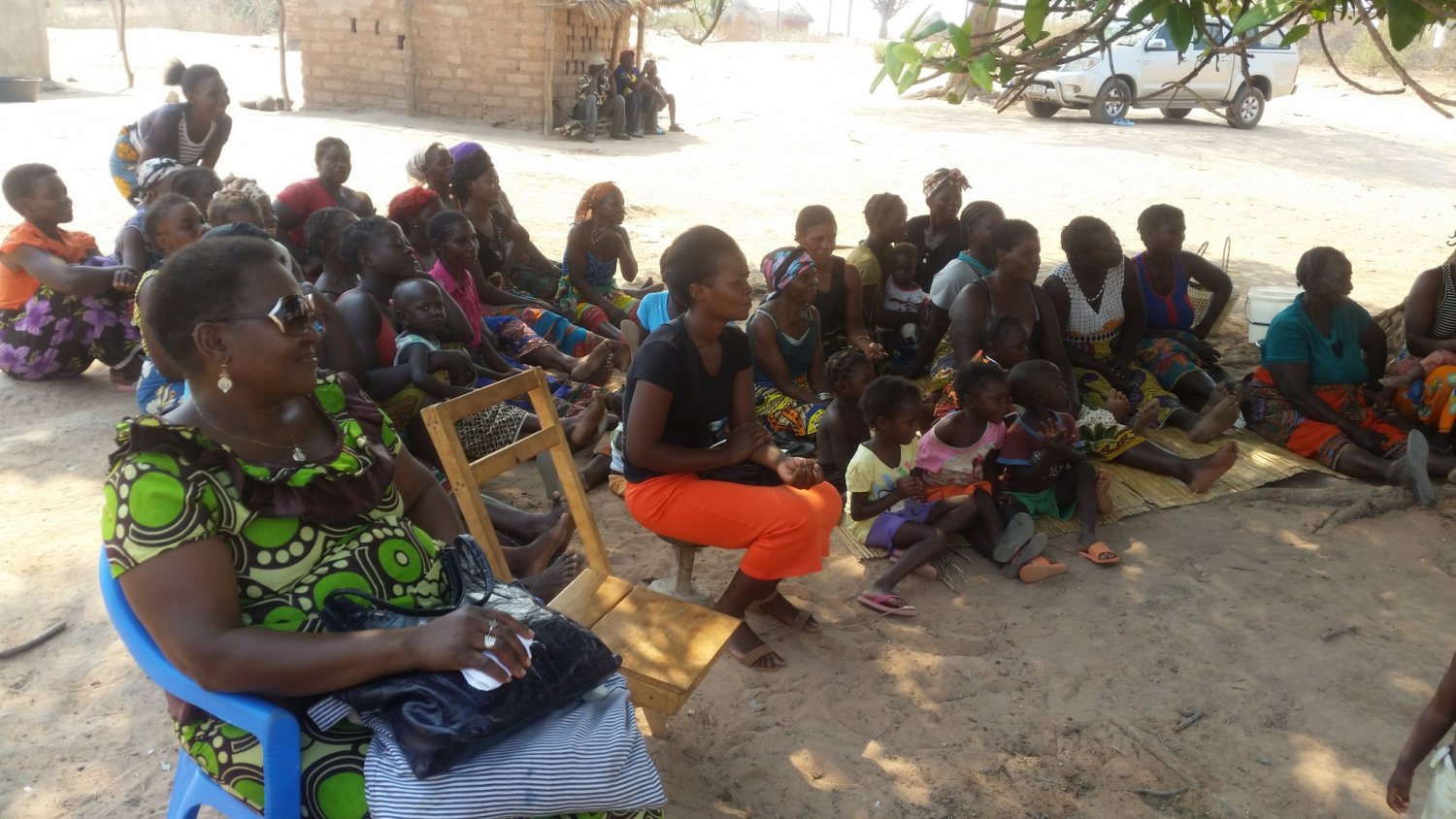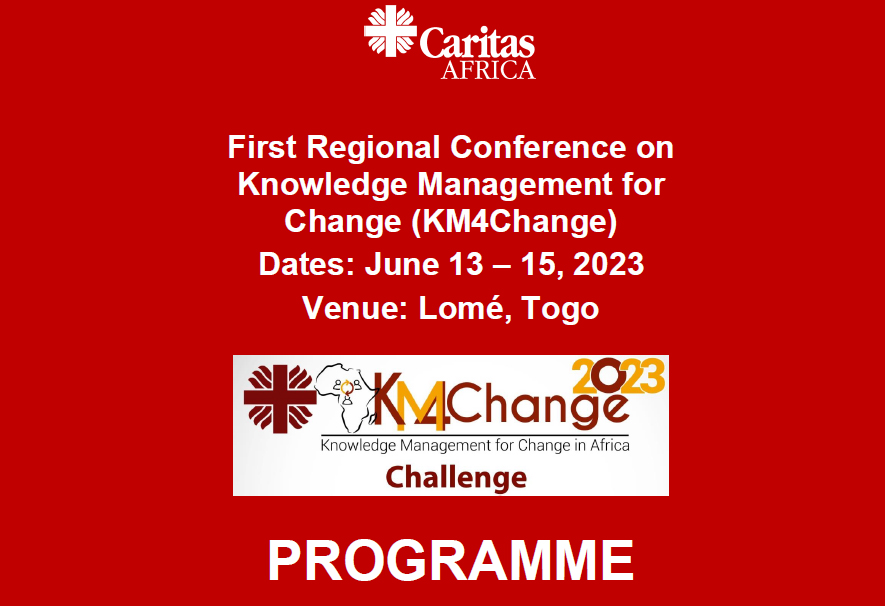Caritas Zambia Submission to the Expanded Planning & Budget Commmitee On Revenue and Expenditure for the Financial Year Ending 31st December 2024.
Download the entire Caritas Zambia Submission to the 2024 National Budget here: https://caritaszambia.org/phocadownload/policy_briefs/Caritas-Zambia-Submission-to-the-2024-National-Budget.pdf
Download the BROCHURE for Traditional Seed and food Festival 2023 here:https://caritaszambia.org/phocadownload/posters_brochures_banners/Traditional-Seed-and-food-Festival-2023.pdf
One week after the release of Pope Francis’ apostolic exhortation Laudate Deum, faith leaders around the world are endorsing support for a Loss and Damage Fund to mitigate the detrimental and unjust impacts of climate change already affecting the poor. Many Global South nations contribute the least to the climate crisis, yet pay the heaviest price of other nations' operations. At COP28 (November 30 – December 12), faith leaders will deliver a statement calling on world leaders to protect the poor and work towards true climate justice.
“Solidarity demands urgent action by those with means and responsibility. A Loss and Damage Fund that genuinely meets the needs of people at the frontlines of the climate emergency is not just a responsibility; it is an undeniable moral imperative,” says President of Caritas Internationalis Msgr. Archbishop Isao Kikuchi.
Loss and Damage refers to the impacts of climate change that are already being experienced around the world, especially by people in the Global South. Following the global climate talks at COP27 in Egypt last year, a breakthrough decision was reached to establish a Loss and Damage Fund for communities suffering from the current climate emergency.
Senior Vatican representatives, faith based groups from climate vulnerable countries and diverse stakeholders all contributed to the discussions held at COP27, and particularly reflected on the moral case for action on Loss and Damage. According to the UNHCR, more than 20 million people are forced to leave their homes due to extreme weather events including sea-level rise, prolonged droughts and severe flooding, and environmental degradation.
Caritas Internationalis and SCIAF (Caritas Scotland), together with CIDSE and the Laudato Si’ Movement, believe that there is a deep disharmony at the heart of the climate crisis which is hurting our poorest brothers and sisters the most.
“A Loss and Damage fund should not just be symbolic, but one that supports those who bear the brunt of the climate crisis. In the face of the escalating climate crisis, this commitment to fairness and accountability should serve as the cornerstone of efforts. Let us rally together in solidarity and purpose!” says Alistair Dutton, Secretary General of Caritas Internationalis
The final details of the Loss and Damage Fund will be agreed at COP28 in Dubai later this year, and faith leaders will deliver their statement in support of a fit-for-purpose fund to protect the poor which: gets money to the people who need it the most; is adequately resourced based on the polluter-pays principle; fully addresses non-economic losses and damages; and corrects the injustice of poorer nations paying the price of other nations’ actions.
The urgency to act is growing every day and the price for our lifestyles is already being paid by those who have contributed the least to the climate disaster. "The Loss and Damage fund is simply a matter of justice and recognition of responsibility. What's needed now is the courage to take the decisions and make the fund and mechanisms a reality,” says Josianne Gauthier, Secretary General of CIDSE.
In light of the realities of the climate crisis, Tomás Insua, Executive Director of the Laudato Si’ Movement, calls for shared vision for the future based on justice and compassion: “Let us be the generation that rises above indifference, challenges the status quo, and paves the way for true solidarity with the Loss and Damage Fund."
Endorse the Loss and Damage Fund statement here https://campaign.sciaf.org.uk/loss-and-damage-moral-case-action
Download the entire Faith Leaders Unite to Support an Inclusive Loss and Damage Fund Ahead of COP 28 Championing the Cause of the Poor statement here: https://caritaszambia.org/phocadownload/general/Faith-Leaders-Unite-to-Support-Inclusive-Loss-and-Damage-Fund-Ahead-of-COP28-Championing-Cause-of-Poor.pdf
CARITAS INTERNATIONALIS
Marta Petrosillo
Director of Fundraising & Media Relations
+393476413344
This email address is being protected from spambots. You need JavaScript enabled to view it.
SCIAF
Sarah Swaroop
Head of Communication
This email address is being protected from spambots. You need JavaScript enabled to view it.
CIDSE
Giorgio Gotra
Communications Manager
This email address is being protected from spambots. You need JavaScript enabled to view it.
LAUDATO SI’ MOVEMENT
Priscila Vintimilla
Assistant Director of Communications and Data Manager
This email address is being protected from spambots. You need JavaScript enabled to view it.
We are happy to announce the 𝟔𝐓𝐇 𝐙𝐚𝐦𝐛𝐢𝐚𝐧 𝐓𝐫𝐚𝐝𝐢𝐭𝐢𝐨𝐧𝐚𝐥 𝐒𝐞𝐞𝐝 𝐚𝐧𝐝 𝐅𝐨𝐨𝐝 𝐅𝐞𝐬𝐭𝐢𝐯𝐚𝐥 𝟐𝟎𝟐𝟑.
A purely Zambian Food Festival that culminates into the celebration of our culture and tradition, through promotion and preservation of our indigenous food and seed.
Come through to the 𝑴𝒖𝒏𝒅𝒂𝒘𝒂𝒏𝒈𝒂 𝑩𝒐𝒕𝒂𝒏𝒊𝒄𝒂𝒍 𝑮𝒂𝒓𝒅𝒆𝒏𝒔 𝒐𝒏 𝒕𝒉𝒆 13𝒕𝒉 & 14𝒕𝒉 𝒐𝒇 𝑶𝒄𝒕𝒐𝒃𝒆𝒓!
Experience the taste of Zambian indigenous foods and learn about Zambian traditional seed!
Under the theme " 𝑪𝒆𝒍𝒆𝒃𝒓𝒂𝒕𝒊𝒏𝒈 𝑻𝒓𝒂𝒅𝒊𝒕𝒊𝒐𝒏𝒂𝒍 𝑺𝒆𝒆𝒅 𝒂𝒏𝒅 𝑭𝒐𝒐𝒅 𝒇𝒐𝒓 𝑯𝒆𝒂𝒍𝒕𝒉𝒚, 𝑺𝒂𝒇𝒆 𝒂𝒏𝒅 𝑵𝒖𝒕𝒓𝒊𝒕𝒊𝒐𝒖𝒔 𝑭𝒐𝒐𝒅 𝒇𝒐𝒓 𝑷𝒆𝒐𝒑𝒍𝒆, 𝑷𝒍𝒂𝒏𝒆𝒕 𝒂𝒏𝒅 𝑻𝒉𝒆 𝑬𝒄𝒐𝒏𝒐𝒎𝒚 "
Come and have the perfect Zambian experience by Sampling traditional food from all the provinces and interact with Local farmers that will be showcasing traditional seed varieties from all across #Zambia.
Entry to this experience is completely 𝐅𝐑𝐄𝐄!!! 𝐅𝐑𝐄𝐄!!! 𝐅𝐑𝐄𝐄!!!
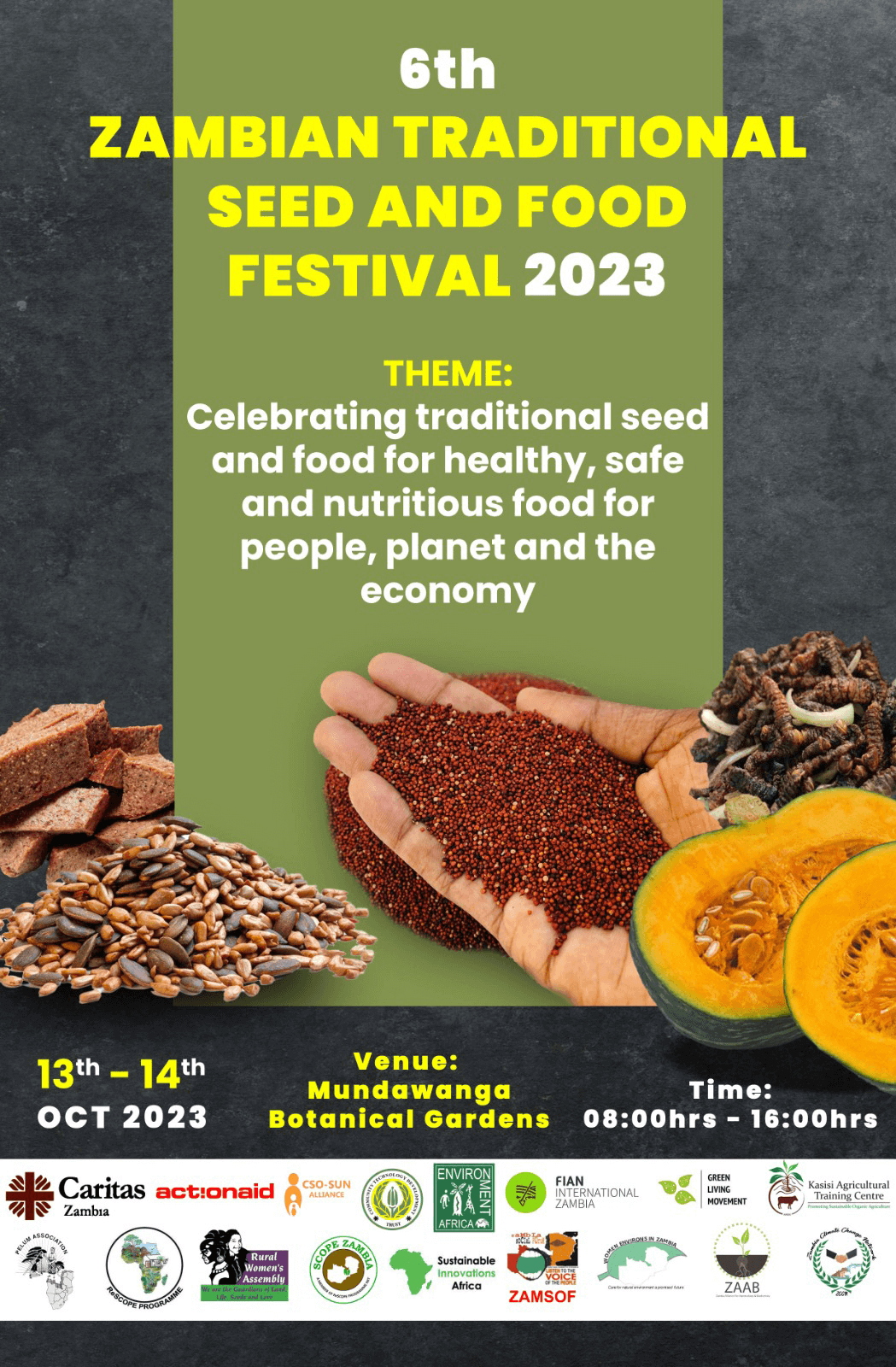
Ladies and gentlemen,
I am deeply honored to stand before you today as we gather at the Zambia National Food Systems Insaka organized by the Zambia Alliance for Agroecology and Biodiversity (ZAAB), in collaboration with our esteemed partners such as the Community Technology Development Trust (CTDT), Zambian Governance Foundation, Oxfam in Southern Africa, PELUM Zambia, Zambia Climate Change Network (ZCCN), Hivos, the National Food and Nutrition Commission and all of you, the dedicated stakeholders who have come together to discuss the future of Zambia's food systems.
The food system is not just an essential part of our economy; it is the bedrock of our nation's well-being. It sustains livelihoods, shapes our culture, and, most importantly, it is a fundamental human right. However, our food system faces unprecedented challenges today, from the impact of climate change to inequitable global trade relations that threaten its very stability. Moreover, the way our food system operates is a significant contributor to climate change itself.
Around the world, there is a consensus that we must transition to sustainable food systems. These systems are rooted in principles of agroecology, food sovereignty, and the right to food and a healthy environment for all. Such a transition requires integrated governance mechanisms at all levels, with the active participation of all stakeholders. However, Zambia currently lacks an overarching food system policy and the cohesive governance structures needed to guide this critical transition.
Despite this challenge, Zambia has committed itself to this just transition through national and international agreements. We understand that time is of the essence as we face the growing climate crisis and deteriorating public health. Our food system encompasses multiple actors and activities, and how well these components are governed affects everyone, from farmers and consumers to policymakers, businesses, and especially our vulnerable populations, including women, youth and children.
In recent months, we've witnessed significant efforts in critical policy areas that impact our food system, including the development of the 'Comprehensive Agriculture Transformation Support Program' (CATSP), climate finance regulation, Zambia’s aspirations to join the 1991 International Union for the Protection of new Plant Varieties (UPOV91), the review of the Biotechnology and Biosafety Policy and Zambia's commitment to the Post-2020 Global Biodiversity Framework. These policies touch on issues such as intellectual property rights, genetically modified organisms (GMOs), and harmonizing laws with the African Continental Free Trade Agreement (AfCFTA).
As concerned stakeholders, we recognize the interconnected effects of these policy processes, which bring both positive and negative outcomes. We also see that certain stakeholders hold greater influence over policy outcomes, and, regrettably, private interests often take precedence over the public good. Therefore, it is crucial to reflect on how these policy changes affect our ability to transition to a just, healthy, and sustainable food system that operates within our planet's boundaries while respecting the cultural and socio-economic rights of all.
That is why ZAAB and our partners have come together to convene this Food Systems Indaba. Our primary objectives are clear:
- To unite all food system actors to interact, deliberate, and identify opportunities for building a resilient and just food system in Zambia.
- To develop actionable steps for all rights and responsibility holders to move toward a sustainable future.
- To focus on critical issues, including the need for an African (and Zambian) food policy, the future of agriculture production systems, seeds and seed-related laws and policies, and the rejection of UPOV membership and GMOs.
Our desired outcomes are equally clear:
- To establish discourse on addressing the drivers and consequences of the current unsustainable food system.
- To gain support from various food system actors for a 'GMO-free Zambia' and the recognition of Farmers' Rights.
- To secure buy-in and commitment from key stakeholders to a process of positive intervention for a just and resilient food system backed by a Zambian food policy.
In these two (2) days, we will engage in interactive sessions, hear expert presentations, listen to farmer testimonies, and collaborate in group work. We will brainstorm and envision what constitutes a just and sustainable Zambian food system.
This activity will contribute to ZAAB’s main activities including the No-to-UPOV91, No-to-GMOs, and the My Food is African Campaigns. Together, we can and will make a difference. Let us embark on this journey with unity, determination, and the shared vision of a just, sustainable, and resilient food system for all Zambians.
Thank you for your dedication, and I look forward to the fruitful discussions and actions that will emerge from this gathering.
Fr. Dr Gabriel Mapulanga, ZAAB Chair, Caritas Zambias Executive Director
PRESS RELEASE - 14th JULY, 2023
Caritas Zambia has learnt about the arrest of the 8-year-old boy of Matero East Township in Lusaka with dismay. It is so disheartening to see such things happening in this age and time when the country has so many laws that have been enacted to support the protection, promotion and fulfilment of children’s rights and wellbeing. Among these laws include; the Penal Code (Amendment) of 2022, the Children’s Code Act of 2022.
Download the entire Caritas Zambia Statement on Detention of 8-year old Lusaka Boy here: https://caritaszambia.org/phocadownload/general/Caritas-Zambia-Statement-on-Detention-of-8-year-old-Lusaka-Boy.pdf
PROTECTION FROM ABUSE AND EXPLOITATION
Caritas Internationalis - Children and Vulnerable Adults Safeguarding Policy
1.1. Purpose
Caritas recognizes the right of children and vulnerable adults to protection, regardless of gender, race, culture and disability. Caritas recognizes the power dynamics inherent in working with children and vulnerable adults and the potential for abuse and exploitation by staff of people we work with.
Caritas is committed to creating and maintaining an environment which promotes its core values and prevents abuse and exploitation of all people. Caritas staff and associates are expected to uphold the dignity of all people with whom they come into contact by ensuring that their personal and professional conduct is of the highest standards at all times. They are equally expected to serve with integrity and promote the right relationships while taking their responsibilities.
Caritas recognizes the unique needs of children and vulnerable adults and, therefore, commits itself to creating and maintaining an environment that protects these individuals.
Download the entire Caritas Internationalis - Children and Vulnerable Adults Safeguarding Policy here: https://caritaszambia.org/phocadownload/general/Caritas-Internationalis-Children-and-Vulnerable-Adults-Safeguarding-Policy.pdf
The First Regional Conference on Knowledge Management for Change (KM4Change) will be held from June 13 to 15 June, 2023 in Lomé, Togo
PROGRAMME
A. PURPOSE OF THE CONTINENTAL CONFERENCE
The overall objective of the Conference is to climax the 2023 maiden edition of the KM4Change programme as another step in strengthening Knowledge Management in Caritas and improved production and productivity in the developing sector as a whole.
Participants will present their results, receive certificates as “Certified Knowledge Managers”, be inducted into the Africa KM4Change Community of Practice and network with the wider global KM Community.
Download the entire First Regional Conference on Knowledge Management for Change (KM4Change) - Programme here: https://caritaszambia.org/phocadownload/general/KM4CHANGE-Conference-2023-Program-EN.pdf
Zambia is endowed with abundant natural resources beyond just mineral wealth such as arable land, forests, wildlife, and water resources. Yet the country remains one of the world’s poorest. Over 50% of its 19.6 million people live in poverty and about 40% in extreme poverty. A post COVID-19 poverty assessment by the World Bank suggests that poverty has worsened since the pandemic with more people than before falling into extreme poverty. The population is very young, with over 50% falling below the age of 35. Regardless, youth unemployment is high and stands at 46% compared to general unemployment estimated at 39%.
Download the entire Repositioning Zambia’s Mining Tax Regime for the Energy Transition - Policy Brief, March 2023 here: https://caritaszambia.org/phocadownload/policy_briefs/Policy-Brief-Repostioning-Zambias-Mining-Fiscal-Regime.pdf
- Caritas Zambia Statement on the Non-disclosure of ZCCM-IH Deal
- CARITAS Zambia Statement on Mealie-Meal Shortage
- CARITAS Zambia Bulletin 2022 2nd Edition
- Mines & Mineral Development Amendment Bill N.A.B NO 31 of 2022 - Caritas Zambia & PWYPZ Submission to Parliament
- Message of His Holiness Pope Francis for The Sixth World Day of The Poor
- POLICY BRIEF: Localisation As A Response To Enhancing Resilience Of The Food Systems
- Zambian Traditional Seed & Food Festival
- 2023 Budget Address By Hon Dr Situmbeko Musokotwane, To The National Assembly On 30th September 2022
- UPND's One Year in Government - CARITAS Zambia Review
- Declaration of the SADC PEOPLE’S SUMMIT - Kinshasa, 17 August, 2022
About Caritas Zambia
Caritas Zambia is a Catholic Organisation that is an integral structure of the Zambia Conference of Catholic Bishops (ZCCB). The Conference of Bishops is a permanent grouping of Bishops of a given nation or territory that jointly exercises certain pastoral functions on behalf of the Christian faithful of their territory. This is done for the sake of effective evangelisation. To promote the principle of the common good which the Church offers humankind, especially through forms and programmes of the apostolate which are fittingly adapted to the circumstances of the time and place, is the role of Bishops.
Kapingila Hse, Kabulonga Rd, Plot BRT6, P.O.Box 31965, Lusaka 10101, Zambia.
Tel: +260-211-260980 | +260-211-261789

